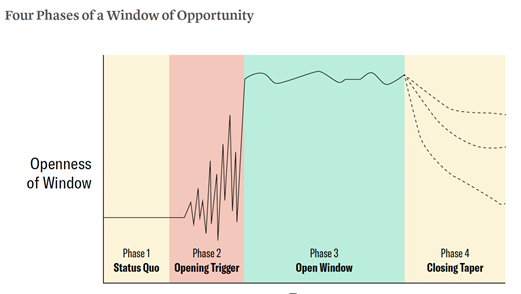Putting Anticorruption Reformers' Needs Back in the Center of International Support: Windows of Opportunity, Politics and the Extractive Sector
A few weeks ago, we had the opportunity to revisit insights from a study we published last year. Our research had looked at reformers' learning needs during anticorruption windows of opportunity. We had the privilege to listen to international actors who provide support for improving governance of extractive industries, as well as to reformers who had served in government. We heard about the barriers to reform during times of high uncertainty and opportunity—what we called the trigger and opening of the window. And they shared sometimes deeply personal insights about challenging times when windows tapers and the less sexy—but no less important—times we refer to as the status-quo phase.

We brought what we’d learned in that research into a recent event convened by the Columbia Center on Sustainable Investment (CCSI), as part of its work on the Politics of Extractive Industries. The discussion focused specifically on the political obstacles facing reformers pursuing good governance in the oil, gas and mining sectors. Because we met under the Chatham House Rule, we won’t share names or affiliations. Still, we wanted to share the rich set of insights which resonate with our study as well as with important debates going on in the field.
Putting reformers in the center
The politics of reform is about structures, but it is also about people and inspiring their individual and collective agency. The latter point is often forgotten in international support strategies. We heard from reformers in the extractive sectors the myriad of serious political, professional and personal risks they take. During the course of our research and at other convenings during this past year we have heard similar stories from reformers in other sectors.
Personal risks and costs are multifaceted. As windows unfold, many reformers experience burnout. A team of reformers in Brazil told one of us that the best thing their organization had done during a window was to provide for weekly de-stressing sessions. Too many reformers face deep personal crises when they have to make difficult decisions under pressure - Run for office or stay in civil society? Join a protest or stay non-partisan? Stand up against the position of that human rights group you’d normally agree with in 100 other battles, or stay quiet to support other priorities? The challenge becomes even more difficult when family relationships and friendships become the site of political retribution or when a politically motivated killing hits close to home. Listen to Ondrej Podstupka & Zuzana Wienk open up about the effects of the murders of Jan Kuciak and Martina Kusnirova on them.
We need to think of support inter-temporally. Anticorruption triggers are short, especially when looked from outside, but windows often span longer. They may open and close many times over the years. The reformers in the CCSI meeting reminded us that when we talk about the micro and macro political economy supporting reforms (or not) we also need to grapple with uncertainty and emotions. Over time, the latter may shape preferences, beliefs, and incentives. Eventually, they may feed structural aspects of change. All of these factors inform what action is possible to inspire in a window or not.
The need to help reformers manage change—by acting as sounding boards and thinking through options together rather than international actors dictating the path—is another issue that was relevant to reformers in the extractives event and our broader report.
In our report we talk extensively about the untapped potential of “windows veterans”—reformers who have gone through a window—and the shortcomings of an international support architecture that fails to tap into their perspectives. Windows veterans have gained invaluable knowledge about the politics and realities of trying to make change happen. In the 21st century, this group of veterans is scattered around the world, rather than just in a handful of “model” countries. Sometimes, the owners of this tacit knowledge stay in the trenches —a university, a civil society group, a parliament, or the bureaucracy. Many times, however, the risks and burdens twist their career paths and anticorruption reformers move on to other fields of work. As we heard colleagues in the extractives field talk about the potential value of learning from counterparts and veterans, we remembered many other stories. Stories of colleagues who not only take with them “institutional memory”, but also are setting incentives for others to join the bench of anticorruption work or not. When veterans leave the field disappointed, sick, and/or ostracized, they are sending a signal to those that may come later to find a less burdensome career path.
Stop looking for a character checklist
We have presented our report to many international support providers. There is a question that usually they put to us: How can I know that a reformer is trustworthy? We cannot provide a list of personal character traits.
Several international support suppliers, however, have provided as close to standardized guidance as we can provide: having local relationships and local intelligence from diverse sources is at the core of identifying a real reformer from a fake one. Outsiders are probably better off investing in the system and supporting a range of reformers, including established ones and others in the pipeline, instead of trying to play kingmaker. We remember when international players bet on Alberto Fujimori (then President of Peru) as a poster child of reform (he was even a featured speaker at the International Anti-Corruption Conference in 1997).
The related recommendation is for international actors to play convening roles, not only facilitating trust building and exchanges of information among “clusters” of reformers who may decide to collaborate or not later, but also by opening space in those events to address existing asymmetries of power. One of the participants in the CCSI event, for example, talked about using events to ensure that reformers that may be “unseen” in a bureaucracy are listened to by more boisterous or higher profile stakeholders. As the DLP program has argued: we need to stop searching for a political hero with political will—which is a collective construction.
If this is the case, then those international suppliers who are working with in-country offices and intermediaries committed to playing convener and facilitation roles prior to a window have a significant advantage over those that rely on ad hoc informants and fixers when the trigger attracts international attention. But realizing these benefits, and gaining additional political economy insights along the way, requires the adequate long-term allocation of resources, both human and financial, which many organizations are unwilling to commit. Conveners and participants do work for free.
Also, reformers in “hot spots” for anticorruption rapid response often receive more invitations to briefing meetings from different donors than is productive. Lack of coordination among donors creates concrete burdens and trade-offs. Donors would do them a significant favor if they coordinated with each other - which we realize would require allocating donor time. As reformers in Guatemala told us, the latter model puts an undue burden to already stretched reformers on the ground. So, one way to maximize the effectiveness of convenings is to be respectful of the time of those who sit and those who don’t sit at that table.
Looking beyond the trigger
These pointers are important: while a trigger and an open window are sexy from the outside, a significant portion of the reformers and suppliers we spoke to consistently point to the status quo and tapering phases as shaping the boundaries of what is possible from the inside when a country is “hot”. Windows can be attractive, but ensuring that reformers are safe and don’t feel they have been abandoned when the international attention and financing move elsewhere also needs to be part of the equation.
Similarly, actors spoke of micro-windows—either small openings falling outside a big window or the specific opportunities for progress within the big window—as important in their own terms. The focus on micro windows also helps acknowledge the gradual nature of much anticorruption change and the agency and relationships that support it. A variety of extractives-specific windows that might be emerging, including around the energy transition and deepening demand for new sets of minerals, could be potential examples.
Finally, a word about the “obstacles” for funders stepping into and supporting action during windows of opportunity. Many assume one of the main obstacles for supporting reformers during windows is operational—if only we could disburse quickly enough. This may be part of the story for some international players, though it varies: many reformers mentioned the bandwidth and flexibility they needed during critical junctures, which are harder to scale up, including with more funds.
Often international observers are attracted to triggers and finding their way when things seem static, even if much groundwork is being laid out. The trigger moments create a sense of urgency and “can do” attitude, but they may also reveal self-importance beyond what is warranted. Participants who brought their experience and tacit political economy knowledge spoke of the need for greater humility in thinking about the roles international actors can and cannot play. Any approach needs to recognize that governance reform is complex and challenging and global actors need to be both realistic about what they can achieve and strategic about how they work. Brian Levy’s reflection on the evolving World Bank approach to anti-corruption provides an unusual glimpse into the evolution of thinking within some international suppliers.
Also, some global actors are increasingly mindful of shifting ground and “doing no harm”/avoiding unintended consequences through efforts to address political economic obstacles in practice. What sometimes might look like an inability to act fast, or a focus on micro-windows instead of macro-ones, could be more about a risk calculation, one that could be protecting reforms, and reformers, accepting uncertainty and managing risks.
--
These were the major points that resonated from our research and the recent discussions: putting reformers at the center; looking for reformers with local relationships, rather than specific character traits; and looking beyond the triggers. As our research and the discussion hosted by CCSI highlighted, we all have a lot to learn about navigating windows. We continue to be grateful to the reformers who are willing to share their stories and insights.

